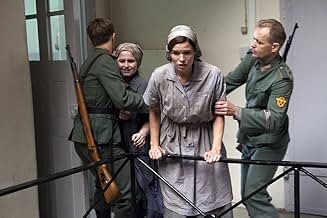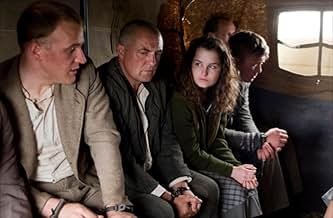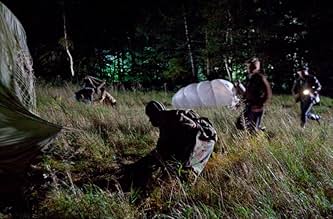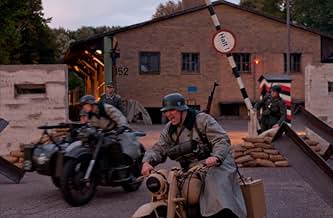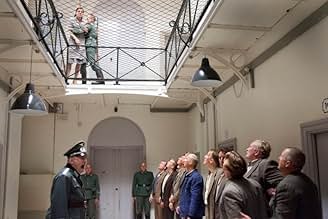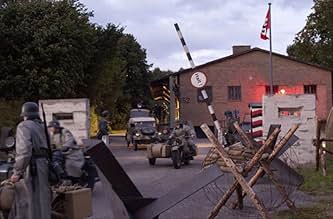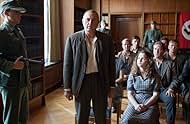IMDb RATING
6.6/10
3.3K
YOUR RATING
The true story of the Fiil family - a family of innkeepers who during Nazi-Germany's occupation of Denmark took up arms against the German occupiers, but in the fight for freedom, some must ... Read allThe true story of the Fiil family - a family of innkeepers who during Nazi-Germany's occupation of Denmark took up arms against the German occupiers, but in the fight for freedom, some must die so that others may live.The true story of the Fiil family - a family of innkeepers who during Nazi-Germany's occupation of Denmark took up arms against the German occupiers, but in the fight for freedom, some must die so that others may live.
- Director
- Writers
- Stars
- Awards
- 4 wins & 5 nominations total
Janus Kim Elsig
- Henning Andersen
- (as Janus Elsig)
Niels Lund Boesen
- Niels Kjær
- (as Niels Boesen)
Jakob Svarre Juhl
- Jens Stenz
- (as Jakob Svarre)
- Director
- Writers
- All cast & crew
- Production, box office & more at IMDbPro
Featured reviews
This is in my opinion one of the best Danish movies, even with our somewhat low budget for movies/series (compared to bigger countries) I actually think it's a well made movie. It's definitely worth a watch if you have a interest in World War II or foreign war movies.
After seeing the film, and now think back to what made the biggest impression, I can say that it is the stunning performance of the characters in the film. An incredibly authentic presentation, both in duologue and body language, and with a great empathy for each role. It is nice to see, that Denmark is still able to bring good acting to the world. The plot shows how naive and trusting in the cause and right the right thing to do, that would be necessary to start an upraising in the first place. The film stands out, by not containing the violence and brutality, that is most common among films describing this particular period. - Thank you for this experience.
The distance between love and hate, justice and evil, courage and fear. The most impressive plot is on the court. Eight courageous human, eight warrior. Not enough nail-biting scenes and plots, paying more attention on human nature and common people.
The whole story-line is based on the second World War, the condition of Denmark. And this film is on of the most boomed Danish Film after 2000. Natural acting expression and fantastic scenes, vivid explaining a true story happened in 1942 Denmark.
Even they know attempts would failed, they still tried. That is why called brave heart.
The whole story-line is based on the second World War, the condition of Denmark. And this film is on of the most boomed Danish Film after 2000. Natural acting expression and fantastic scenes, vivid explaining a true story happened in 1942 Denmark.
Even they know attempts would failed, they still tried. That is why called brave heart.
1. Horrible dialogue. The characters explicitly state their occupations ('I attend the Agricultural College, not a house holding school', 'What's it like being a veterinarian?'). Not a single Danish actor talks like people did in the 1940's, i.e. they keep addressing strangers with the familiar 'du' {tu}, not the formal 'De' {vous}. – The dialogue is forced and full of anachronisms. I got the sensation of watching a bad written school play.
2. No one seems to be affected by the shortage of household goods. During the Nazi occupation, they drink what appears to be regular coffee and carbonated beverages. In fact, there doesn't seem to be a shortage of anything–except German soldiers in the first 45 minutes or so of the movie. What kind of occupation is this? Where are the miserable living conditions of wartime? 3. The resistance people are all way too chatty and amateurish. Everyone in the area knows who's in the resistance, even the kids know. What about a little secrecy? During the nightly activities, they can't get any work done without chatting and small talking. But that's not all, of course, they're also smoking. Even a lit matchstick can be seen from far away! Given the fact, however, that there're almost no Germans in the first part of the movie, why take precautions? No need for stealth operations. – I get it, the resistance members are just ordinary people risking their lives, but why depict them as being utter morons? It's quite insulting, actually.
4. Ridiculous scenes. One scene in particular comes to mind: A quiet, serious man walks into the tavern, wearing trench coat and fedora hat–the whole secret agent or private detective look. But all seriousness is blown away when he claims to be from The National museum of Denmark, looking for some good locations to perform archaeological excavations. – At this point I just laughed out loud. It's such a stupid and funny scene. Again, why depict the characters as idiots? It's not a comedy; at least I don't think it is.
In conclusion, this movie would make a very funny lampoon, if someone cut it down to a 20 minutes short. Nothing but the ridiculous scenes is worth watching, so a shortened version would be highly appreciated.
Thanks to Anne-Grethe Bjarup Riis–and everyone else involved with this uninspiring movie–for ridiculing some brave people who died for a noble cause. May they rest in peace.
One question remains unanswered: Did anyone involved with the production know anything about occupied Denmark in the 1940's? Anything at all?
2. No one seems to be affected by the shortage of household goods. During the Nazi occupation, they drink what appears to be regular coffee and carbonated beverages. In fact, there doesn't seem to be a shortage of anything–except German soldiers in the first 45 minutes or so of the movie. What kind of occupation is this? Where are the miserable living conditions of wartime? 3. The resistance people are all way too chatty and amateurish. Everyone in the area knows who's in the resistance, even the kids know. What about a little secrecy? During the nightly activities, they can't get any work done without chatting and small talking. But that's not all, of course, they're also smoking. Even a lit matchstick can be seen from far away! Given the fact, however, that there're almost no Germans in the first part of the movie, why take precautions? No need for stealth operations. – I get it, the resistance members are just ordinary people risking their lives, but why depict them as being utter morons? It's quite insulting, actually.
4. Ridiculous scenes. One scene in particular comes to mind: A quiet, serious man walks into the tavern, wearing trench coat and fedora hat–the whole secret agent or private detective look. But all seriousness is blown away when he claims to be from The National museum of Denmark, looking for some good locations to perform archaeological excavations. – At this point I just laughed out loud. It's such a stupid and funny scene. Again, why depict the characters as idiots? It's not a comedy; at least I don't think it is.
In conclusion, this movie would make a very funny lampoon, if someone cut it down to a 20 minutes short. Nothing but the ridiculous scenes is worth watching, so a shortened version would be highly appreciated.
Thanks to Anne-Grethe Bjarup Riis–and everyone else involved with this uninspiring movie–for ridiculing some brave people who died for a noble cause. May they rest in peace.
One question remains unanswered: Did anyone involved with the production know anything about occupied Denmark in the 1940's? Anything at all?
'Hvidsten Gruppen' is a Danish film that deals with the country's occupation by Germany from 1940 to 1945. The movie, directed by actress Anne-Grethe Bjarup Riis in her debut as a director, has an interesting and engaging storyline. However, the characters in the film are not very interesting and lack complexity. Despite this, the acting is good, but the material is limited in terms of character development. As a result, the film is given a rating of 6 out of 10 stars.
The story follows a group of Danish resistance fighters who hide a wireless radio transmitter in a village called Hvidsten during the Nazi occupation. The group is led by a family who risks their lives to fight against the Germans and help the resistance movement. However, the characters are depicted as perfect heroes with no flaws, which makes them less relatable and realistic.
The film stars Jens Jørn Spottag as Marius Fiil, Bodil Jørgensen as Gudrun Fiil, Thomas Ernst as Niels Fiil, Maria Bach Hansen as Tulle Fiil, and Laura Winther Møller as Gerda Fiil. The technical crew includes Anders Refn as the technical director and Morten Bruus as the cinematographer.
Although 'Hvidsten Gruppen' is a great story, the lack of character development and complication makes the characters seem flat and one-dimensional. The characters in 'Hvidsten Gruppen' are depicted as flawless heroes with no complex emotions, fears or flaws. The film lacks complication as there are no drunken or argumentative characters (in the main group) to add depth and realism. Additionally, the absence of any interrogation scenes creates a hero-centric view of the story, allowing the characters to remain pure and uncompromised in their intentions without ever facing any significant challenge or temptation.
Overall, 'Hvidsten Gruppen' is a film that highlights an important chapter in Danish history, and it is relevant to understanding the country's past. The film raises questions and topics of universal significance and is definitely worth the watch. It is good, but not great.
The story follows a group of Danish resistance fighters who hide a wireless radio transmitter in a village called Hvidsten during the Nazi occupation. The group is led by a family who risks their lives to fight against the Germans and help the resistance movement. However, the characters are depicted as perfect heroes with no flaws, which makes them less relatable and realistic.
The film stars Jens Jørn Spottag as Marius Fiil, Bodil Jørgensen as Gudrun Fiil, Thomas Ernst as Niels Fiil, Maria Bach Hansen as Tulle Fiil, and Laura Winther Møller as Gerda Fiil. The technical crew includes Anders Refn as the technical director and Morten Bruus as the cinematographer.
Although 'Hvidsten Gruppen' is a great story, the lack of character development and complication makes the characters seem flat and one-dimensional. The characters in 'Hvidsten Gruppen' are depicted as flawless heroes with no complex emotions, fears or flaws. The film lacks complication as there are no drunken or argumentative characters (in the main group) to add depth and realism. Additionally, the absence of any interrogation scenes creates a hero-centric view of the story, allowing the characters to remain pure and uncompromised in their intentions without ever facing any significant challenge or temptation.
Overall, 'Hvidsten Gruppen' is a film that highlights an important chapter in Danish history, and it is relevant to understanding the country's past. The film raises questions and topics of universal significance and is definitely worth the watch. It is good, but not great.
Did you know
- TriviaBased on a true story of a resistance group in Nazi occupied Denmark during World War II.
- GoofsIn the opening scenes the women are preparing meals in the kitchen while the men are playing cards. Both places the radios were switched on and you immediately hear the transmission of the speech of the Prime Minister. Before the invention of the transistor the components in a radio would need some ten seconds before they were warm enough to work properly and make the transmission work.
- ConnectionsFeatured in Hvidsten Gruppen: Hvidsten Gruppen - De sidste vidner (2012)
- How long is This Life?Powered by Alexa
Details
Box office
- Gross worldwide
- $9,388,513
- Runtime2 hours 2 minutes
- Color
- Aspect ratio
- 2.35 : 1
Contribute to this page
Suggest an edit or add missing content


